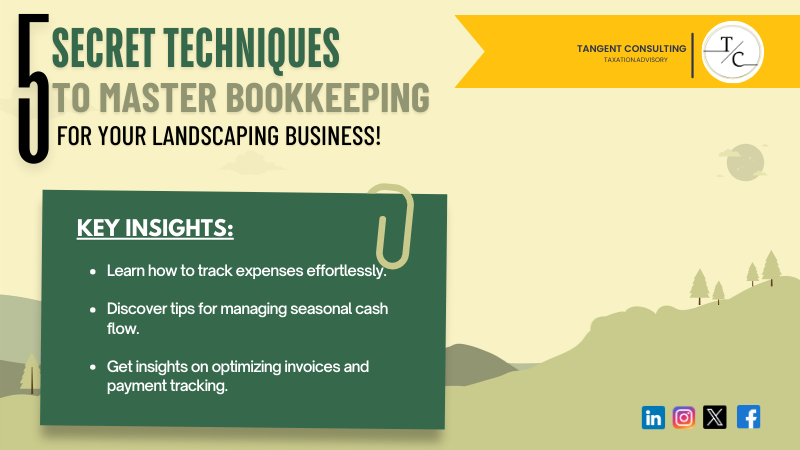Apply These 5 Secret Techniques to Improve Bookkeeping for Landscaping Business
Apply These 5 Secret Techniques to Improve Bookkeeping for Landscaping Business

Let’s say you own a landscaping business called Green Landscaping. It’s early spring, and your schedule is packed, but you want to do the taxes.
However, you realize there’s a roadblock; you can’t seem to understand anything.
Instead of focusing on blooming gardens, you are tangled in spreadsheets and wondering how to prepare for tax season.
If this sounds familiar to you, the good news is you can improve bookkeeping for landscaping business with a few simple techniques.
So, if you own a landscaping business or are looking to start one, this guide can help you gain control over your books.

Why Bookkeeping is Important for a Landscaping Business?
Have you talked to a small business owner recently? If you do, they will say that managing finances is one of the biggest hurdles they face.
For landscapers, expenses can vary wildly with seasons and projects. So, organized bookkeeping can mean the difference between growth and struggling to stay afloat.
Think of it this way: every project has hidden costs—from unexpected equipment repairs to fluctuating fuel prices. They can easily eat into profits if you don’t track it.
A well-organized bookkeeping system brings all the costs to light, showing you exactly where your money goes. This clarity doesn’t just keep cash flow steady; it helps you plan for downtime and big purchases. In addition, clean financial records ensure a smooth tax season.

5 Secret Techniques to Improve Bookkeeping for Landscaping Business
We do wish bookkeeping were as straightforward as planting a tree: dig a hole, place the sapling, add some water, and watch it grow. Unfortunately, numbers don’t bloom quite as easily, especially when it comes to tracking every expense, invoice, and payment in a landscaping business.
But just like the right soil and sunlight make all the difference for a garden, the right techniques can transform your bookkeeping.
So, let’s dig into five game-changing strategies to improve bookkeeping for landscaping business.
1. Create a Detailed Landscaping Business Plan
Think of your business plan as the blueprint for a well-designed garden: without it, you risk planting the wrong things in the wrong places.
A clear, detailed plan outlines not only your services but also your pricing, seasonal expenses, and goals.
By defining every factor of your business, you have a roadmap for your finances. And when you know the costs, you can set aside funds for essentials like equipment maintenance, fuel, and labor, making it easier to track expenses accurately. This foundational work prevents financial bloopers.

2. Track Everything, We Mean Everything
In landscaping, every dollar counts—whether it’s a bag of mulch, a new lawnmower blade, or fuel for the truck. So, leaving out “small” expenses can add up fast, creating gaps in your records that make it harder to see the real picture of your finances. That’s why it’s essential to track every single expense, no matter how small it seems.
When you track everything, you can avoid budget surprises and get a clearer sense of your cash flow. This habit also makes tax season a breeze, as you’ll have all your receipts and expenses in order.
3. Decide the Accounting Method
Choosing the right accounting method is like picking the right soil for your projects; it impacts everything that grows from it.
For landscaping businesses, the two main accounting options are cash basis and accrual basis.
The cash basis method records income and expenses when they’re actually received or paid, making it ideal for smaller businesses. The accrual method, on the other hand, records income and expenses when they’re earned or incurred, which can offer a more accurate long-term view but adds complexity.
Selecting the method that best aligns with your business size and goals helps you simplify your bookkeeping and ensures accurate financial reporting.
If you’re unsure, you can schedule a free consultation with us, and we can help you weigh the pros and cons of each approach.

4. Use Financial Statements
Think of financial statements as the health checkups for your landscaping business. Just as plants need regular care, your business needs consistent financial reviews.
Key reports like the income statement, balance sheet, and cash flow statement give you a clear view of where your money is coming from, where it’s going, and how much you have left to grow your business.
In fact, we created a whole guide on how financial statements can save you money and headaches. You can check it out here.
5. Use a Software
Maybe you like the good ol’ ledgers, but the days of using them are gone. With bookkeeping software, managing a landscaping business can be as easy as trimming a hedge.
A good software tool automates many of the tedious tasks like tracking expenses, generating invoices, organizing receipts and even forecasting cash flow.
When deciding on accounting software, you can look for features like expense tracking, invoicing and integration with your bank account.
Speaking of accounting software, if you want to try beginner-friendly software with all the features, you can check out QuickBooks.
If the numbers or the technical stuff seems confusing to you, you can always consider hiring a pro. Tangent Consulting has years of experience working with landscaping businesses in bookkeeping, CFO services, tax preparation, and business consulting.
PS If you are reading this, it means you can have access to our free consultation for your landscaping business. Avail this for free today, before we change our mind 😉
Final Thoughts
Improving bookkeeping for the landscaping business may not seem exciting but it’s necessary for your growth. With these five techniques, the sail in your business boat will be smoother.
If accounting seems like solving trigonometric equations to you, we have your back. We provide CFO, bookkeeping, and tax services to help you sleep better at night. So, no more Mr. Numbers coming in your dreams. You can check out all our services here.
FAQs
Is running a landscaping business easy?
Running a landscaping business isn’t easy—it requires a blend of physical work, financial management, and strategic planning.
Which is right for your business, bookkeeping or accounting?
Choosing between bookkeeping and accounting depends on the needs and size of your business. For smaller landscaping businesses, bookkeeping might be enough, while accounting provides detailed analysis that supports long-term growth.
What is the cost of starting a small landscaping business?
Starting a small landscaping business typically costs around $5,000 depending on the equipment and services you plan to offer.
